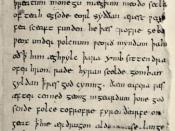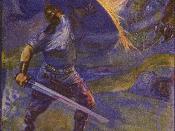A Christian's Take on a Worldly Tale
Beowulf, a worldly folk tale, is surprisingly full of Christian values, traditions, and symbolic references. This book was written by a priest who loved history of all kinds, especially Anglo-Saxon. Of course, being a priest he naturally tied in his religious beliefs. The folk story emphasizes the virtues of loyalty, courage, and faith in the face of extreme dangers and even death. These teachings are compatible with Christian teachings. Self-sacrificing for the sake of others alludes to the Christian's Lord and Savior, Jesus Christ, and how He came to earth to suffer and die in order to save us from our sins. Similar moral values are evident throughout this book and the Christian's Bible.
The first virtue I would like to bring out is the importance of loyalty in Beowulf. The greatest demonstration of loyalty in the story is when Wiglaf doesn't flee Beowulf's side in the face of the dragon.
While the rest of Beowulf's companions, "crept to the wood, protected there. In only one of them the heart surged with sorrows... He was called Wiglaf" (57). Without Wiglaf Beowulf couldn't have defeated the dragon and would have most certainly died. There also seems to be a consistent minor theme of loyalty to king and country. I saw this especially when Beowulf returns home and first humbles himself before his ruler. There is a distinct attitude change in Beowulf when he speaks to his king, like when he says, "On your kindnesses all still depends" (51). This quote shows that Beowulf still gives all power and authority to the king, even though he probably could have taken both. He also remains loyal to his country by risking his life to protect and serve them in any way and by never killing...



Boewulf...
This is a well-thought out and well-written paper. I enjoyed reading this paper.
3 out of 6 people found this comment useful.